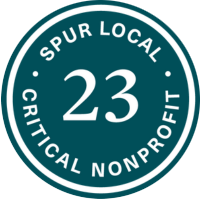
My name is Shira Markoff, and I have lived in Woodley Park in Ward 3 for the past nine years. I’m a member of Jews United for Justice’s (JUFJ) DC Leadership Council and Housing Security Working Group. JUFJ is a community of thousands of Jews and allies committed to advancing social, racial, and economic justice in DC. I am testifying today in support of the Green New Deal for Housing Amendment Act of 2022, because it would both address the need for more affordable housing in the District and provide more climate-friendly housing. Before I begin, I want to note my disappointment that this hearing was moved, after many working people had made time in their schedules for the original date and are unable to participate today.
My support for this legislation, as well as my volunteer work with JUFJ, is inspired by a rich tradition of Jewish activism and solidarity with marginalized communities on economic and racial justice issues, including right here in DC. A core value guiding my testimony is that every person has inherent value and no one should go without having their basic needs met, which includes having safe and stable housing.
DC currently has a severe shortage of affordable housing. I see it every day throughout the city with the growing number of unhoused individuals living on the streets or in tents, even as the weather gets colder. I also see it as more and more luxury developments go up around the city that are only accessible to a privileged few, while few truly affordable units are built. I also know that for all the visible signs of the housing crisis I’ve observed, there are many more individuals and families who are struggling to pay rising rents or who are facing eviction.
Although DC has programs to address housing affordability, they are not sufficient for the scale of the crisis, and, in particular, are not meeting the needs of families at the lowest income levels. For example, the District has failed to meet statutory requirements to use 50% of the Housing Production Trust Fund for deeply affordable housing. People also continue to wait years for housing vouchers, and the unsafe and unsanitary conditions in public housing have made headlines. The lack of affordable housing is most acute for Black and Latinx individuals and families, including long-time residents who are being displaced from the District and replaced by predominantly white people who can afford exorbitant rents.
The Green New Deal for Housing offers a new way forward that could better meet the needs of residents with low incomes. It would create the Office of Social Housing Development to plan, develop, and support social housing, which would be mixed-income and environmentally sustainable. One third of units would be deeply affordable for those with incomes that are 0-30% of the area median income (AMI), another third would be affordable for people with incomes 30-50% of AMI, and the other third would be market rate units that would subsidize the affordable units. As a long-time DC renter who is fortunate enough to have a job that allows me to pay market rate rent, this model appeals to me. I would be happy to know that my rent payments would be subsidizing the rents of other tenants, rather than enriching developers or management companies.
I urge the council to pass the Green New Deal for Housing Amendment Act to make a meaningful investment in deeply affordable housing that will help to promote racial and economic justice in the District, while also taking steps toward addressing the climate crisis. Thank you for the opportunity to provide testimony on this important issue.





